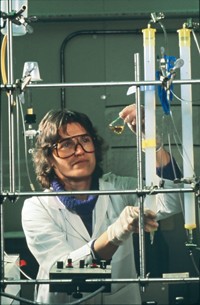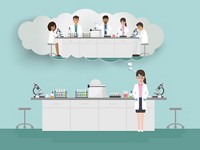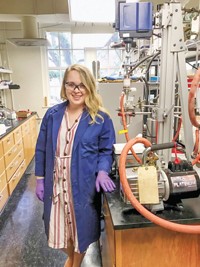Advertisement
Grab your lab coat. Let's get started
Welcome!
Welcome!
Create an account below to get 6 C&EN articles per month, receive newsletters and more - all free.
It seems this is your first time logging in online. Please enter the following information to continue.
As an ACS member you automatically get access to this site. All we need is few more details to create your reading experience.
Not you? Sign in with a different account.
Not you? Sign in with a different account.
ERROR 1
ERROR 1
ERROR 2
ERROR 2
ERROR 2
ERROR 2
ERROR 2
Password and Confirm password must match.
If you have an ACS member number, please enter it here so we can link this account to your membership. (optional)
ERROR 2
ACS values your privacy. By submitting your information, you are gaining access to C&EN and subscribing to our weekly newsletter. We use the information you provide to make your reading experience better, and we will never sell your data to third party members.
Policy
Reflections
by Allison Campbell, Guest editorial
September 25, 2017
| A version of this story appeared in
Volume 95, Issue 38
The following is a guest editorial by Allison A. Campbell, associate laboratory director for the Earth & Biological Sciences Directorate at the Pacific Northwest National Laboratory and president of the American Chemical Society.
I am an enthusiastic cyclist. I spend a lot of my free time riding, competitively and recreationally, and I have done so without an incident more serious than the occasional flat tire that every cyclist expects. But a funny thing happened on a ride last month. I set off on a beautiful August morning on my trusty bike, Ruby, for a ride along one of Washington, D.C.’s many scenic bike trails. The route was familiar, but as I approached the Jefferson Memorial, I decided to divert to a new path that I had not ever ridden.
Since I regularly ride near my home in Washington state, I know the trails there quite well, including the overall quality, locations of potholes, and other hazards to be avoided. Additionally, we don’t get much rain, so it did not occur to me to pay any particular attention to puddles on the trail. So as I rode through a large puddle that morning, I was surprised when my front wheel dropped into a deep crater, sending me hurtling over my handlebars. My nose and chin slammed against the trail’s packed-gravel surface. I picked myself up slowly, stunned, stinging, and bleeding profusely. I was, all in all, fortunate. Even though I felt fine, I made a visit to the emergency room. I had neither a concussion nor broken bones: only scrapes, bruises, and two front teeth that were slightly pushed in but easily straightened.
There is a saying that a man who gets kicked by a horse gets a lot of information very quickly. I can attest to a similar sort of rapid learning in this instance, and I think my experience and mistakes may be especially relevant to those of us who work in laboratories and other hazardous environments.
First, I credit myself with having done some things right. I was wearing a helmet. I had my phone with me. I had inspected the bike, ensuring that the brakes and lights worked and that the tires were properly inflated. After the accident, I went to the emergency room even though I felt fine. Finally, I remembered to notify the laboratory and my manager that I had been in an accident while on business travel. These were all important safety steps. Yet in the end, those precautions were insufficient for a safe ride. I had made some critical errors of judgment. Foremost among them was my failure to consider potential hazards in an unfamiliar environment and my overconfidence in my abilities. I allowed myself to lower my level of awareness. I crashed in an environment that appeared to be more benign and safe than many in which I ride, under the mistaken assumption that I had no need for the usual vigilance I would exercise riding on mountains, on busy roads, or in harsh weather.
This reduced vigilance allowed me to assume that a puddle was a puddle and meant I did not factor in the possibility of a deep crater beneath the surface. I failed to recognize a potential hazard and to account for the fact that I was in an unfamiliar place on an unfamiliar road. Not considering this possibility is what spurred me to steer toward a hazard rather than around it.
We are all experts of one form or another, whether in the laboratory, the office, the kitchen, or any number of other settings. Expertise is deeply gratifying, but it is also a potential trap when it leads to overconfidence and a false sense of familiarity. Since my accident, I have been thinking about the idea of the “beginner’s mind” popularized by the Zen monk Shunryu Suzuki back in the 1970s. Suzuki observed that, as beginners in any practice, we are fully present and humble as we dedicate ourselves to learning something new and are on guard to grasp things we don’t know or might miss. As we accumulate skill and experience, the intensity of our awareness tends to erode. Suzuki urged us all to nurture our beginner’s mind, regardless of how advanced we might become at our pursuits, and to recognize that we are always beginners. Until recently, I had not thought about Suzuki’s advice as practical safety guidance.
So the lesson I learned as I lay face down in my own personal reflecting pool is simple: Never lose your beginner’s mind. Pay attention, and keep an eye out for new or unfamiliar conditions. It’s harder than it seems, and it just might keep you on your path in an upright position.
Views expressed on this page are those of the author and not necessarily those of ACS.






Join the conversation
Contact the reporter
Submit a Letter to the Editor for publication
Engage with us on Twitter